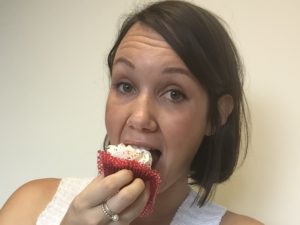
When it comes to extra kilojoules, a little more self-restraint won’t go astray as the day progresses. New research from Flinders University and Liverpool University has studied the urge to snack more later in the day, even when we start the day with a healthy resolve.
More than 300 young women (17-25 years old) were targeted in the research, comparing respondents’ positive and negative responses to cake in the morning versus their responses in the afternoon.
“Our findings showed a tendency to automatically think of unhealthy snack foods in a more positive manner as the day progressed, which previous research has shown to contribute to greater craving, desire, and ultimately, consumption of those foods,” says Dr Ashleigh Haynes, Flinders University psychology researcher who has commenced post-doctoral studies at the University of Liverpool, England.
“This highlights that it might be especially important to implement strategies that replenish our capacity to control automatic responses, or limit the availability of unhealthy snack foods later in the day, when we tend to evaluate those foods more positively.”
The research paper, with co-authors Flinders Professor Eva Kemps and Griffith University’s Dr Robyn Moffitt, was released this week.
‘Is cake more appealing in the afternoon? Time of day is associated with control over automatic positive responses to unhealthy food’ calls for further research into how to combat these urges.
“For example, it may be that the capacity to control the way we automatically think about unhealthy foods declines throughout the day, explaining a more positive evaluation of those foods,” Dr Haynes says.
“The beliefs we have about the kind of foods that are appropriate for consumption at certain times may also be partially responsible for the way we cognitively respond to those foods.”
Flinders University lecturer in nutrition and dietetics, Dr Kacie Dickinson, says the results might be explained by “our commonly accepted standards for snacking”.
“Think afternoon tea breaks and the foods we consider usual to consume at these times – like cakes, donuts, biscuits, chocolates and salty snacks,” says Dr Dickinson, an accredited practising dietitian.
“Unfortunately, many common snack foods we eat are highly processed, with high amounts of sugar, fat and salt, so potential strategies to reduce people’s intake of these foods is really important.”
Snacking between meals is not necessary for healthy people to maintain a healthy balanced died, Dr Dickenson points out. But healthy snack options for between meals can include a piece of fresh fruit, 1/3 cup of unsalted nuts or a small tub (170g) of natural yoghurt.
In Australia eating between meals tends to be more common among young people than older people.
Eating between meals might be necessary for people with special dietary needs, for example elite athletes and diabetics.
The ‘implicit association test’ used in the latest research found the respondents associated junk food with negative experiences (e.g. sickness, even death) in the morning but this changed to more positive feelings (e.g. holidays) in the afternoon. Tradition and culture, along with body and mind, play a part in these experiences.
“This research is useful in increasing our understanding of a range of influences on perceptions of foods and can help inform ways to decrease unhealthy food consumption to stem the increasing rates of overweight and obesity and related chronic disease in the community,” Dr Dickinson says.
The paper was published in the latest Elsevier Food Quality and Preference journal.

